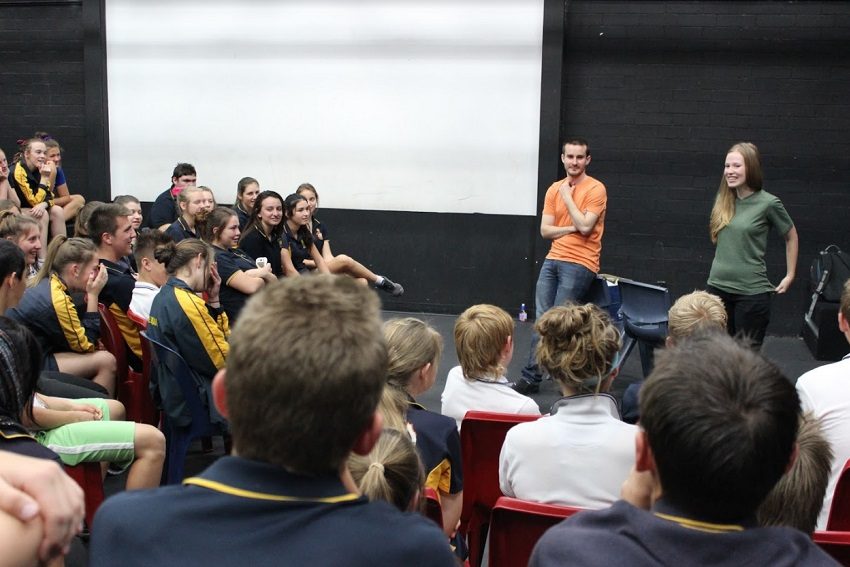Rehearsing for the Real World with ActNow Theatre

Theatre has always been an artistic medium ripe with politics and social critique, but Edwin Kemp Attrill’s ActNow Theatre pioneers a new, participatory form of the ancient art with the goal of spreading awareness and establishing social justice for all.
“People think theatre is stages and curtains and costumes and props and lights – and it can be that,” says Edwin Kemp Attrill, founder and director of ActNow Theatre, “but really theatre is about people coming together and sharing stories. That’s what theatre is.”
ActNow is a very different kind of theatre, indeed. As Attrill says, his company works contain key theatrical elements of stories, people and audience, but that’s about as close as it comes to our traditional view of the scripted stand-and-deliver theatre we are familiar with.
“The kind of theatre I’m interested in is much more participatory,” says Attrill. “After a few years of working as a director doing fairly conventional projects, I began to realise that when you see conventional theatre, there’s a few people on stage under lights and they’ve got the power to tell the story and audience all sit in the dark and they face the same direction and pretend that they don’t exist.”

Attrill is focussed on social justice and improving the world we live in. He says ActNow’s work is a sort of “rehearsal for the real world” where “audiences are able to contribute to the stories” and “not about telling the audience what do to, but working with the audience to come up with some kind of solution to certain problems.”
While one might expect a focus on social justice to be dictatorial, where crowds are lectured on their ignorance and told to change, Attrill’s approach is anything but authoritarian. Using a participatory style of presentation known as ‘Forum Theatre’,
ActNow brings an audience together to consider daily scenarios where people might feel maligned for things like their gender, social status, race or sexuality. “In the play you show the problem and tell the audience, ‘We don’t know what the solution is. We want to find out what the solution could be for you, the audience’,” Attrill says. “Then we go back and we do the play again, and the second time we invite the audience members to come up on stage to replace a character and try something differently. That way it’s not us saying ‘This is what you should do’, but it’s us being open to rehearse with the audience their own ideas for creating social change.”

Considering the subject matter and process, an ActNow ‘show’ is not something some friends would head along and see after dinner on a Saturday night. Instead they are organised specifically to tackle an ongoing issue in a corporation or community.
“Most of the projects we do are commissioned by non-arts partners,” says Attrill, “So we’ll get organisations that will come to us and say, ‘We want to explore this or work with this sort of community’. “I’ve done a bit of work in youth prisons. A lot of the bigger projects have come from organisations like the Legal Services Commission of South Australia, Reconciliation SA and Amnesty International. Sometimes they just book a one-off workshop or show, but often it’s a partnership that might go for two or three years where we do maybe 50 or 100 shows and keep a project going.”

Much of Attrill’s work with ActNow takes him to schools across South Australia. He is bolstered by the open-mindedness of today’s youth, but recognises the importance of open discussion in the way they approach the world. “For the most part, young people don’t want to be racist or be homophobic,” he says.
“They want to support multiculturalism and gay rights and support other people, but they maybe don’t how to, or don’t know what the language is. It’s about taking the enthusiasm that young people already have, and the compassion and their interest in social justice, and creating ways for them to go about it.
“It can be difficult when the subject matter is really heavy and sometimes quite serious. We try to make sure the projects are completely fun and playful, so people want to get involved, not trying to make people feel guilty or anything like that.”

With 10 years of work under its belt, Attrill looks forward to growing ActNow in the months and years to come. “I think that we’re at an exciting point because there’s growing interest in the work,” he says, excited for potential ventures interstate, expected growth in his team, and partnerships with groups such as Reconciliation SA continuing for more than three years. ActNow’s rise as an agent for change comes at a time when participatory theatre is growing in popularity generally.
Attrill attributes the successes in ActNow’s method and the growth of participatory theatre to two things: humans’ innate desire to play and a changing social structure. “The two groups that I’ve worked with where the games work best are kids in prison and adults in corporations, because they don’t have access to games,” he says. “Play is one of the most important aspects of learning and the people that don’t have access to games and don’t have access to art are the ones who need it the most.”

On society’s changing shape, Attrill points to the growth of the internet and collaborative mediums as an example of how human interaction and structures are shifting. “Theatre hasn’t changed, but society has changed so much with the development of things like social media or Wikipedia or peer-to-peer networks.
In every aspect, society hierarchies are being replaced by those sorts of networks, so our work is not about the one-way direction of information, but about a collaborative sharing way of creating theatre.” actnowtheatre.org.au
Photos by Olivia Allen, Heath Britton, Phil Brown